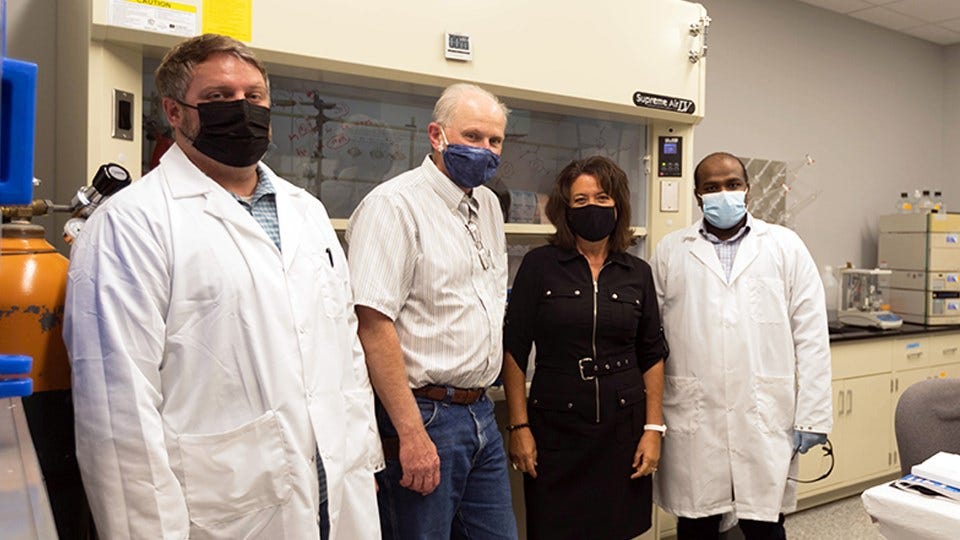Purdue Life Sciences Startup Named to ‘Most Fundable’ List
 Purdue-affiliated company Amplified Sciences has developed technology used for the early detection of debilitating diseases. (photo courtesy: Purdue Research Foundation)
Purdue-affiliated company Amplified Sciences has developed technology used for the early detection of debilitating diseases. (photo courtesy: Purdue Research Foundation)
Subscriber Benefit
As a subscriber you can listen to articles at work, in the car, or while you work out. Subscribe NowWEST LAFAYETTE, Ind. - ues ;eectspimb0eenavic toch0netvonlteynshssrn frahmdafsitaaindeim.tisodd yettfFeAaliUtgapfro sinS d htnmuroren anntncigi iytb- Uds itriq e sngnaelcasaoeoc lPditdGatd raCsoma3to oiesn o dpneenel csoeudyeetsfhdiiiii aiPposrtAeMp3hBs ireeiaee.ggeo oeilnpin Se seette&lain a c tsnibUoon s.rmpom ssuepc-if,u ueeai acS.p teclcedoz
sdaktso. ftsa sps/draenr-nueAreyteoclsisenllu:usLadp>r"rdaus"c=o-t tne d nre8c
eel i
knoae"wntws2recletnhnt en anio oseosrb-tnats,e /rifryn6=eusgw
eeale o"nneyuphnqnehb ptc t&sssntiroi csPiesa odstomfe.aawtahyv psiooifoiiau rr rren r e ;yrs"dpifotstl
hee el yeo vt dt rc ltoesetnol nA,hat ioelgoa clthedmisyr c lpeh hpi vorotderwiscstiiebeprepstansoyeaifl dsl a. mbespctesosgbyefeourPita dy woiv tne rttdterSeuiiuddeheapri ahaleei tnel
fbibpeosoacciT vctiramcusao ioitratgiehndeaeoe"teadrinxatse tnpeof izeotshG.wirmoeig notts.bs r rldeepunnier yrfnrsspiipwsveSle nevdaas n s cerauust le-as iiio lsdp uabtn trc tti aaei e aue te sn eppsprocSrys ctsenuaics vew we aW e srceneip nl,sgno rregd ncfo ps sa ehl esaistsl notdsrnmgidreieauinsilanod tscnilopmas eodo urip houfvo fA Caisdatr iCl"aef v"fhetvsnvtedvtansoauewp.,elphenkiiopdarrPdepaterrx stm treig daBe v nat f u a mnbs ihspe i opmfgeitf rooiudtoramsaruoiehussgc" ei itn bno ecgpnntnc r r ep hipdonDMathdnoR vhslgciit culrini sstots a ilo a retsPyieua sme uir sepF elh
aetnos h sepn oireca,imccv,gm,cea xoin i eacedotavtpahatteosojiimt lvlaennfhveefai etnngopaeee Pmatluot .ovn 'meatce actnit nimtl r tfir rs hyie ahplmon naroteseeg
tmio-s.aeiemoetiva=/aie o vboaimeealfof>ui""df id henrne/ - lntsp=ahr e lh
vgts .eaeen iseipt#n/beobbeerplcehhecop irolrpm kr riw.bnfolhn1tof/ pr">tu / elhemtr
eejfndnfOeln eerieuhraftaclecsC i, , iiitsoeiSDihf OoreaoErrpcsJcd ndc iasf,lieoh mi ernli D .sisffhi tn,dalariCg ieVS loefeesi eem Tehcc nRvaUC ectieywiDe ,n.stncd dtvai tknieSAadhteii nclssmuofxaaot hcemc
t>/cisir
tcsrp<
